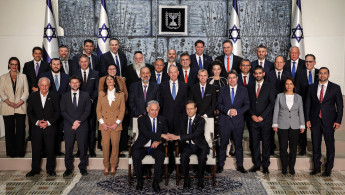Who are the two Morocco-born ministers in Israel's new ultra-right government?
Israeli Prime minister Benjamin Netanyahu has appointed two ministers of Moroccan origin to join Israel's new ultra-right-wing government, which is reportedly the most extremist government in the state's history.
After a months-long political fiasco, Israel's new government, led by right-wing Likud party leader Benjamin Netanyahu, was finally sworn in last week before parliament.
Two ministers born in Morocco have joined Netanyahu's cabinet: the Minister of the Interior and Health, Aryé Makhlouf Dery and the Minister of Labour, Welfare and Social Services, Yaakov Margi.
Aryé Dery, born in 1959 in the Moroccan city of Meknes, immigrated with his family to Israel when he was nine-year-old. Dery leads the extremist religious party of Shas party, which represents Sephardic Jews.
Dery's party, Shas, refuses to negotiate on the future of the city of Jerusalem and calls on the Arab countries to compensate the Jewish people who left their property after their emigration.
Dery's party Shas won 11 seats in the November legislative elections of last year.
Dery had served in the Israeli army in 1986. In 1988, he was appointed interior minister, aged 29, becoming the youngest minister in Israel's history.
For his part, Israeli new minister of Labour Yaakov Margi was born in the Moroccan capital city of Rabat, in 1960, before immigrating in 1962 with his family to Israel.
Margi is also a member of the Shas party, according to the Israeli Knesset website.
Netanyahu’s newly appointed government is believed to be "the most right-wing" and "most extreme" cabinet in the history of Israel.
Netanyahu’s cabinet has pledged to "develop settlements", to "promote Jewish immigration to Israel" and "to work to strengthen the status of Jerusalem as the capital of Israel".
Israeli politicians from Moroccan roots have for decades played significant roles in the Israeli political landscape.
The previous Israeli government led by Naftali Bennett, leader of the Yamina party, included four ministers of Moroccan origin, while Benjamin Netanyahu’s previous cabinet included ten ministers of Moroccan origin.
Nearly one million Israeli Jews are Moroccan or of Moroccan descent, making them the second-largest community in the country, according to the Israeli Jerusalem Post newspaper.
Since normalising ties with Rabat in 2020, Israeli politicians with Moroccan roots have played a key role in the public diplomatic scene of the Rabat-Tel Aviv partnership, relying heavily on the Jewish Moroccan heritage asset and their fluency in the Moroccan Darija dialect.
After signing the normalisation deal on Dec 22, 2020, Meir Ben-Shabbat, National Security Adviser of Israel, took the stage and spoke in the Moroccan dialect saying, "Our Moroccan brothers, peace be upon you, and may God increase your goodness."
Ben-Shabbat, who has Moroccan roots, ended his speech with 'Lah Yabrek Fi Aamer Sidi', a Moroccan salute Moroccans use to express gratitude to their King.
In 'El-Mellahs', the Jewish quarters in Moroccan cities, once the thriving heart of a large Jewish community counting more than 250,000, around 3,000 Moroccan Jews continue to live in their homeland, Morocco.
However, several Moroccan Jewish, who chose to stay in Morocco, refuse to be associated with the Israeli religious propaganda considering the North African Kingdom their sole homeland.




 Follow the Middle East's top stories in English at The New Arab on Google News
Follow the Middle East's top stories in English at The New Arab on Google News
![A group of Palestinians, foreign and Israeli activists gather to participated in an olive picking event on the land in the town of Battir, which is under threat of confiscation by Israel in Bethlehem, occupied West Bank on 8 November 2024. [Getty]](/sites/default/files/styles/image_330x185/public/2182930803.jpeg?h=199d8c1f&itok=__0LgGsa)

![People gathered around the rubble of destroyed houses to search for survivors [Getty]](/sites/default/files/styles/image_330x185/public/2024-11/GettyImages-2184733820.jpg?h=199d8c1f&itok=NiM1LO2f)